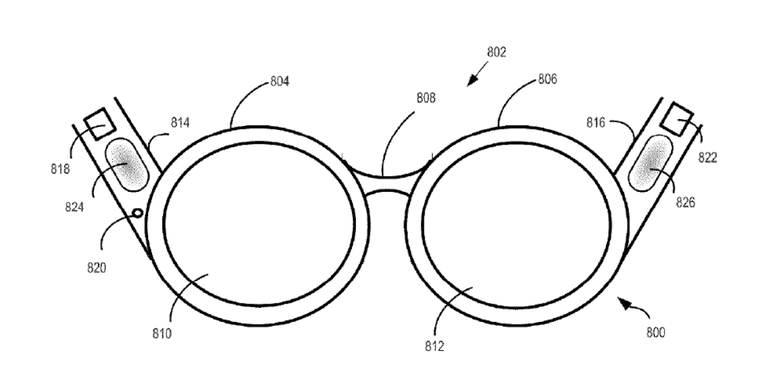Yay or Nay? Google Wants to Store Your Memories and Make Them Searchable
![By Antonio Zugaldia (http://www.flickr.com/photos/azugaldia/7457645618) [GFDL (http://www.gnu.org/copyleft/fdl.html) or CC-BY-3.0 (http://creativecommons.org/licenses/by/3.0)], via Wikimedia Commons](https://techtheday.com/wp-content/uploads/2014/03/Google-Glass.jpg)
By Antonio Zugaldia (http://www.flickr.com/photos/azugaldia/7457645618) [GFDL (http://www.gnu.org/copyleft/fdl.html) or CC-BY-3.0 (http://creativecommons.org/licenses/by/3.0)], via Wikimedia Commons
If you think Google Glass and Project Tango were not privacy-threatening enough, check this out. Google has a new project and this time, the goal is to index your real-world experiences to make them searchable.
Last week, July 22 to be precise, Google was granted a patent for a method for recording video using a wearable device and making the recorded video searchable later on. This gives the user an always-on or preconfigured way for recording everyday moments to be stored in the cloud. It will make use of the many technologies Google owns.
The Patent
Filed as US Patent Application No. 61/655,892 on June 5, 2012, the patent is primarily about a computer-implemented method for navigating a virtual camera in a three-dimensional environment. It comes with several other features, though, that essentially make the method a way of storing memories and making them searchable.
This Google patented method involves the use a wearable device with a camera (Google Glass for example) and a smartphone or other web-enabled devices capable of running apps. The two devices will have to be securely paired. The wearable device captures the video and sends it to the paired web-enabled mobile computing device, which in turn uploads the video to a server or the cloud. The video will be saved with keywords to facilitate the searching later on.
The keywords can be set by the user and can also be generated automatically through auto-tagging. The texts of the patent infer that videos will be tagged by time and location. Moreover, the patent suggests that video recording can be automatically initiated when the user is at a popular location, which will likely be the preferred setting to prolong battery life.
The saved videos can be accessed through various devices including the wearable camera-bearing device and the smartphone (or other mobile computing device) used to capture and upload the videos. They can be played through an app that can recognize voice or text questions. For example, to remember that paintings or other art you’ve seen at the Louvre, you can ask “What did I see at the Louvre?” or “What paintings did I see at the museum I visited in Paris?”
Expectedly, Google will be incorporating its vast resources and technologies (Google Now in particular) to make the interaction appear seamless and natural. The system will not just answer simple or straightforward questions. It can also operate in the same way Google Now or iOS’ Siri operates. It can answer questions like “How many books have I read this month?” and “Should I visit the barber again?”
Sharing and Social Media
Aside from storing memories on the cloud, this Google patented method also enables social media sharing. Users can show their memories on social media and view what their friends are sharing. Again, accessing these memories don’t have to be robotic and too keyword-based. The memories can be searched through questions like “Where did my friends go last night?” or “Who attended the party last weekend?”
Expected Uses
This system is designed for everyone but it is of greater benefit to those who tend to easily forget details in their everyday lives. It can be for personal use and will be highly useful in certain workplaces. Moreover, it can be used for elderly family members who may already be suffering from severe memory problems. There are many perceivable uses for this technology although there are as many possible concerns.
Privacy Concerns
Privacy advocates will likely be assailing this Google developed system. It will most likely be viewed as a privacy offender that is worse than Google Glass. Many establishments and public offices will most likely be frowning upon the idea of having to interact with people who are using this system. It can essentially transform everyone into a walking CCTV camera. With the facial recognition abilities of Google Glass incorporated, it can even answer queries like “Who did I meet between 8 A.M. to 10 A.M. today?”
![By Tedeytan (Flickr) [CC-BY-SA-2.0 (http://creativecommons.org/licenses/by-sa/2.0)], via Wikimedia Commons](https://techtheday.com/wp-content/uploads/2014/02/google-glass.jpeg)
By Tedeytan (Flickr) [CC-BY-SA-2.0 (http://creativecommons.org/licenses/by-sa/2.0)], via Wikimedia Commons
Availability
All of these information, so far, have been derived from a patent application. As such, the system is still a concept. Google, as of now, has no clear plans on actually making it into a reality. It may not even become a reality at all. It is actually a good idea but only for specific settings. Making it widely available may create a world that is not so comfortable to live in.
